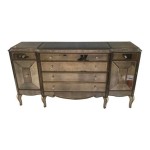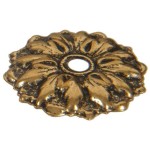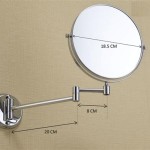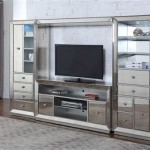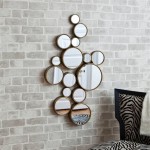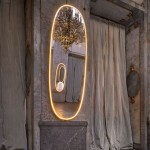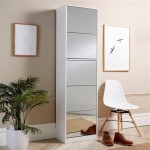Mirror In Front Of Bedroom Door: A Feng Shui Perspective
The placement of mirrors in the bedroom is a topic often discussed within the principles of Feng Shui, the ancient Chinese practice of harmonizing individuals with their environment. Specifically, a mirror positioned directly opposite a bedroom door raises significant concerns and warrants careful consideration. Understanding the underlying rationale behind these concerns is crucial for optimizing the energy flow, or "chi," within a living space and fostering a sense of well-being.
Feng Shui aims to create environments that support health, wealth, and harmonious relationships. The bedroom, as a sanctuary for rest and rejuvenation, holds particular importance. The way chi circulates and interacts within this space can profoundly influence sleep quality, emotional stability, and overall life energy. The presence of a mirror directly facing the bedroom door disrupts this delicate balance, potentially creating imbalances and negative effects.
The primary concern stems from the belief that a mirror acts as a reflector, both physically and energetically. When placed directly across from a doorway, it effectively bounces back the incoming chi, preventing it from properly circulating within the room. This can lead to stagnation, a lack of vitality, and feelings of being unsettled or disturbed. The specific implications of this placement are multifaceted and deserve a detailed examination.
The Reflection of Chi and Stagnation
Chi, often translated as "life force energy," is the fundamental concept in Feng Shui. Ideally, chi should flow smoothly and gently throughout a space, nourishing and invigorating the inhabitants. A mirror facing the bedroom door is considered a significant obstruction to this flow. As chi enters the room, it immediately encounters the reflective surface and is redirected back out. This creates a cycle of energy bouncing back and forth, preventing the chi from fully permeating the room and benefiting its occupants.
This redirection can result in a feeling of stagnation. The room may feel less vibrant, and the occupants may experience a lack of energy or motivation. It can also impact sleep quality, leading to restless nights and difficulty falling asleep. The disrupted energy flow can contribute to a sense of unease and hinder the ability to relax and recharge in the bedroom.
Furthermore, some Feng Shui practitioners believe that the mirror reflects not only chi but also the occupant's personal energy. This can lead to a feeling of being drained or depleted, as their energy is constantly being projected outwards rather than being replenished during sleep. This is particularly important to consider as the bedroom is a space intended for rest and recovery, where one should feel most secure and protected.
The intensity of the effect is also influenced by the size of the mirror. A larger mirror will have a more pronounced impact on the flow of chi than a smaller one. The mirror's position is also important; if it’s angled slightly, it might redirect chi to a different area, but the fundamental principle of reflecting incoming energy remains a significant consideration.
Impact on Relationships and Personal Growth
Beyond simply reflecting chi, a mirror facing the bedroom door is believed to negatively impact relationships, especially romantic partnerships. The reflection creates a sense of doubling or duplication, which can lead to confusion, misunderstandings, and even infidelity. The reasoning behind this stems from the idea of mirroring or "cloning" the relationship, suggesting the potential for external influences or the introduction of a third party.
In a marital bedroom, this placement is therefore particularly discouraged. It is believed that it can foster feelings of insecurity and distrust within the relationship. The mirror can symbolize a lack of privacy and vulnerability, making it difficult for the couple to fully connect and experience intimacy. It might also create a sense of competition or rivalry within the couple, as each individual is constantly confronted with a reflection of themselves.
Beyond romantic relationships, this mirror placement can also impede personal growth and self-reflection. The constant reflection may lead to an overemphasis on external appearances and a lack of introspection. It can also reinforce existing insecurities and hinder the development of self-confidence. The bedroom should be a space for personal healing and self-discovery, and a mirror facing the door can create a barrier to this process.
The effect is thought to be amplified if the mirror reflects the bed directly. This intensifies the impact on relationships and personal well-being, making it even more crucial to address the issue.
Potential for Negative Spiritual Influences
While not universally agreed upon, some interpretations of Feng Shui suggest that mirrors can act as portals or gateways for spiritual entities. A mirror facing the bedroom door, in this context, could be seen as an invitation for negative energies or unwelcome spirits to enter the room. This is viewed as particularly concerning during sleep, when individuals are considered to be more vulnerable to external influences.
This belief is rooted in the idea that mirrors can blur the boundaries between the physical and spiritual realms. The reflection can create a sense of illusion and deception, making it difficult to discern between reality and illusion. A mirror strategically placed can even provide refuge for lingering spirits.
Although not all schools of Feng Shui subscribe to this interpretation, it is still a concern for some practitioners. If a person experiences unexplained feelings of unease, anxiety, or nightmares in their bedroom, they might investigate the possibility of negative spiritual influences and consider whether a mirror facing the door could be a contributing factor.
It's particularly important to be mindful of mirrors that are old, antique, or have a history of being in places with negative events, as they are believed to retain and amplify any pre-existing residual energies.
Ultimately, while the placement of a mirror in front of a bedroom door raises various concerns within Feng Shui, the specific effects will inevitably vary depending on the individual, the environment, and the overall energetic makeup of the space. Understanding the underlying principles and potential implications is crucial for making informed decisions about mirror placement and optimizing the flow of Chi to create a harmonious and supportive bedroom environment.

How To Use Mirrors For Good Feng Shui 14 Steps With Pictures

Why Having Your Mirror Facing Bed Is Bad Feng Shui

Here S Why Your Mirror Shouldn T Reflect The Bed According To Feng Shui Bria Homes

Where Feng Shui Says To Place Mirrors In Your Home

Why Mirror Facing The Bed Is Bad Feng Shui

21 Feng Shui Mirror Placement Rules And Tips For Your Home Fengshuinexus

Feng Shui For Your Bedroom What To Bring In Keep Out Mindgreen

Feng Shui Mirror Facing The Front Door Truth Myth Explained

How To Use A Feng Shui Bagua Mirror And What I Instead
:strip_icc()/LightDwell-3095c5279d0b4511b10d154f3a21a9b7.jpg?strip=all)
10 Feng Shui Rules For Mirrors According To Experts

